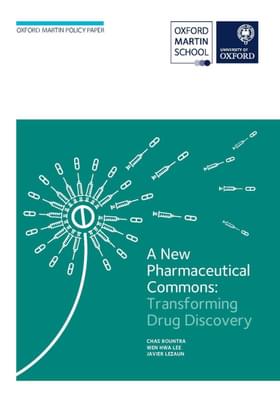
The Oxford Martin Programme on Affordable Medicines was established in 2017 and concluded in 2021. The following page is an archived resource.
The Oxford Martin Programme on
Affordable Medicines

The Challenge
Humanity’s need for new medicines continues to grow unabated, yet our traditional systems for discovering new drugs are inefficient, costly and have high failure rates, with less than 1% of efforts reaching the market.
Drug development is risky and expensive, and some argue that the competitive nature of early-stage research, within academia and industry, means efforts are often duplicated and result in little or no dissemination of knowledge.
However, efforts are underway to establish new, ‘open innovation’ models of drug discovery as an alternative to the traditional closed model of research and development (R&D). These can range from limited, peer-to-peer partnerships through to wide-ranging, open source initiatives, and are beginning to involve groups outside academia and industry, such as patient organisations and charities. But the economic and efficiency benefits of such initiatives are as yet unclear, with little data available with which to inform strategic decisions and policy making.
Our interdisciplinary team draws on both academic and industry expertise, from fields including neuroscience, health economics, development pathways, pharmaceutical pricing, intellectual property and strategic partnerships. We will analyse different R&D models, focusing on both closed and open systems of innovation, to establish answers to the following questions:
- What are the R&D models being practised and considered for the future?
- Who are the stakeholders in drug discovery and what are their roles? How are these contributors changing?
- Are there alternatives to conventional intellectual property (IP) protection?
- What are the economic benefits of different R&D models, for all stakeholders?
- What are the scientific and societal benefits of these new models?
Following our analysis and exploration of specific case studies, we will develop a range of models illustrating current and potential approaches to R&D, considering issues such as drivers of costs, intellectual property, market exclusivity and financial benefits for stakeholders. We will also create a flexible, cost-modelling tool that enables different parties to generate estimates of economic benefits for different stages of drug discovery R&D models.


In order to drive change in a complex and entrenched ecosystem, proof is needed of the benefits of new drug discovery models. We aim to generate solid, data-backed and non-biased evidence upon which to base recommendations for policy making and with which to stimulate innovation and collaboration.

Featured publication
A New Pharmaceutical Commons: Transforming Drug Discovery
This policy paper argues that open science approaches represent the most promising path forward by addressing both scientific and organisational bottlenecks. It reviews open science based initiatives at the University of Oxford and beyond, and examines their potential to increase the productivity of pharmaceutical R&D. The paper concludes by presenting a series of recommendations that would nurture and grow the open science component of the drug discovery ecosystem, potentially transforming how the medical challenges of this century are tackled in a way that is beneficial to patients and producers alike.
People
View allnews
How can governments end the COVID-19 pandemic?
We are now into the second year of life with COVID-19. Although we have overcome the first enormous challenge of swiftly developing and approving several effective vaccines, we are far from ending the pandemic.
COVID-19, intellectual property and access
Will the current system of drug innovation and access to medicines meet global expectations?
Professor Chas Bountra to lead innovation at Oxford
Drug discovery must change to urgently address global health needs
New research aims to unlock power of big data and open innovation for medicine
Keep in touch
If you found this page useful, sign up to our monthly digest of the latest news and events
Subscribe